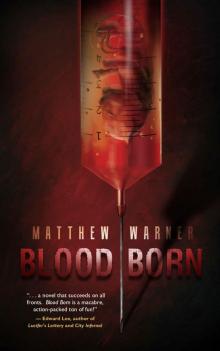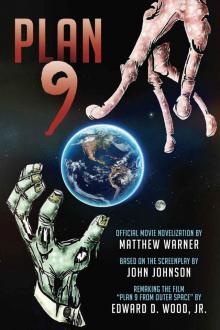- Home
- Matthew Warner
Blood Born Page 26
Blood Born Read online
Page 26
And he was the one responsible for the Frederica Wolford homicide case, as well. He was the one who identified her through the missing persons list. Not Randall. Just because the Frederica hussy was raped by a bigfoot didn’t make it Randall’s case. If it hadn’t been for Randall, distracting him with all of her interference and the way she’d been looking at him, leading him on with her feminine wiles and sending him signals that she secretly wanted him, that she wanted him to follow her home (which he’d done once, but only once), he would’ve been the one sitting pretty right now in the public eye, the hero for being the first cop to connect all the missing persons cases in the region with the bigfoot threat.
The damned hussy. No wonder she was promoted to detective so early in her career. She fucked her way to the top. And she distracted him just long enough to rob him of his big chance, all at the expense of public safety. It was a goddamned dereliction of duty on her part. Not only that, but the clumsy cunt spilled coffee on him, forcing him to haul out the emergency shirt he always kept in his trunk, and then he had to give her one of his best pens just to make her shut her fuckin’ yap about things! If anyone deserved to be raped and paralyzed by a bigfoot, it was her. If he saw that she was in trouble, he wouldn’t help her. He’d watch.
For a moment, he fantasized that the person Mr. Gastineau was now berating on the phone was Detective Randall.
He’d have his revenge on her, one way or another. A Southern gentleman shall never be dishonored, his grandpappy had always said. (Grandpappy had also died in an old-fashioned duel defending that honor, but that was beside the point.)
Gastineau at last put down his phone. He waved off his aides and returned to the throng of police officers. The twin roses of a blush marred his cheeks as he cleared his throat and stomped his cane for attention. “Ah, gentlemen, it seems that we have a dilemma here I hadn’t been advised of until now. This is apparently the third time today that the LH grenades have failed.”
“Were they constructed correctly?” an officer asked.
“Perfectly. I’m assured the hormone concentrations are potent enough to be smelled for miles, if indeed the UPAs can smell them. No, the problem is that the animals don’t seem to be interested.”
The police representatives looked at each other as if for answers. They began to ask more questions.
Gastineau held up a hand. “No, no, I’m sorry. I really have nothing more to say about this. I’m not the expert. I hardly know an LH from a PH, I’m afraid.” The quip earned him a smattering of laughter. “At this time, I’m going to ask you to proceed back into the hallway. An aide will show you to your quarters and to a quick meal in the mess hall. Afterward, you’ll be oriented to the communications stations where you’ll liaise with your respective departments.”
The crowd of policemen chattered as they left the room. Baker fumbled with his crutches, using his infirmity as an excuse to dawdle.
The old man was standing there, nodding politely and watching them go. From his suit jacket’s inside pocket, Gastineau pulled out a pipe and bag of tobacco, then proceeded to pack the bowl. He did this in apparent disregard for the red-lettered NO SMOKING sign on the wall. Perhaps he didn’t see it. Baker, with his superior intellect and detective’s training, of course, did.
“Something I can help you with, detective?” Gastineau said without looking up from his pipe. The exit door banged shut behind the last of the other visiting police officers.
“Why yes, sir.” Baker crutched closer to the gentleman and tried to appear dignified despite his handicap. He had no idea what he was going to say but trusted his enlightened perspective of the world to speak for him. “It occurs to me that I may be uniquely qualified to advise you on matters of discovering the bigf—I mean, UPAs’ origins given as how the phenomenon first emerged in my jurisdiction.”
He loved using words like phenomenon. When they rolled off of his cultured tongue, they showed his high breeding.
“What makes you think they originated in your county?” Gastineau said. “Because they attacked a public hospital there first?”
Baker opened his mouth to say that’s exactly what he thought, but before he could speak, Gastineau said, “Detective, I know you only wish to be helpful and that your offer is in no way an attempt to bias me into giving you any particular attention or privilege—” He paused to stare fixedly at him over his glasses. He lit his pipe with a match. “But rest assured that Homeland Security is quite aware of the circumstances surrounding the apparent origin of the UPAs, and that—”
A young man interrupted Gastineau to speak into his ear. Baker made out bits and pieces.
When the aide hurried off again, Baker seized the opportunity to direct attention away from himself. “Where did he say?”
Gastineau grimaced as he stared into his pipe. “Blue Plains Advanced Wastewater Treatment Plant. It’s at the southern tip of DC on the banks of the Potomac River. A band of about twenty UPAs just attacked it.”
“A sewage plant, you say.”
Gastineau blew pipe smoke at a slotted opening in the ceiling. It sucked up the cloud with disturbing efficiency. “Follow me, detective. You may just learn something.”
Forty-five minutes later, Baker was still with Gastineau in the All-Emergency Room. He hadn’t been asked to go join his peers from the law enforcement community. In a way, he felt like a kid who’d been permitted to stay up past bedtime to watch TV with his parents. He’d even found a place to sit so he could rest his ankle. It was just a metal, cushionless folding chair in the corner, between a paper shredder and a filing cabinet, but it was still something.
Gastineau sat ten feet away in a high-backed captain’s chair, coordinating a chaos of scurrying aides, phone calls, and commands to bring up this or that image on the big screens. He hadn’t looked back at Baker once, but that didn’t matter. Baker was becoming part of the old man’s environment while the other cops were not. Because of this, it didn’t matter very much what was happening with the bigfoots. Baker wouldn’t have cared if an A-bomb had hit Washington, just so long as he was here. However, he still paid attention to what was happening, if only to learn how Gastineau operated—and to seize any opportunities to make himself valuable.
The UPA attack on the sewage plant in DC was not one of those opportunities. At about 2010 hours, the night shift at the Blue Plains facility had evacuated—hard hats and clipboards flying—as dozens of bigfoots descended on them from all directions.
One of the bunker’s large monitors showed an interactive diagram of the sewage plant from its own website. The place was a sprawling campus of pool-like sedimentation tanks and basins. They filtered wastewater through a series of stages for treatment by microorganisms and chemicals before being discharged into the Potomac River. Mousing over the various areas of the map brought up captions like Debris and Grit Removal, Secondary Reactors, and Sludge Loading and Post Liming. They each had bizarre descriptions like, “Secondary treatment is accomplished by means of a step-feed modified aeration-activated sludge process.”
An engineer on a speakerphone informed Gastineau that the creatures had entirely ignored the workers at the plant—even the women. Instead, the last he saw them, the animals were frolicking—he actually used that word, “frolicking”—in the outdoor primary sedimentation tanks. Centrifugal blowers supplied oxygen to the tanks to promote the growth of microorganisms, creating a frothy foam effect like a jacuzzi. He said the creatures were splashing around and coating themselves with what he called “suspended solids.”
“I tell ya,” the caller said without a trace of irony, “that’s some weird shit.”
Gastineau solved the problem by ordering an airstrike with attack helicopters. The air-to-ground missiles ignited the latent methane of the fecal sludge and created explosions that could be seen for miles.
Afterward, aides watched the old man as he stroked his whiskers and muttered, “Troubling, most troubling.”
“Why are they attracted to sewage an
d not to the LH grenades?” an aide said.
Detective Baker regarded the little toady with contempt. Don’t you know how to brownnose? he wanted to say. The old man obviously was asking himself the same question. You’re only making yourself appear foolish by being two steps behind his thinking process. The key is to be two steps ahead—contribute something useful before the old man thinks of it. Baker stretched his ankle as he bided his time.
Gastineau began to load his pipe. “Refer the matter to our laboratory network. Priority alpha.”
As Baker’s sojourn in the command room moved into hour number two, he watched Gastineau leave the matter of the sewage plant to concentrate on troop movements and disaster containment. At the same time, Gastineau kept an eye on traffic cameras that showed a huge bottleneck of unmoving cars and trucks on Interstate 66, as civilians continued to evacuate.
Gastineau seemed particularly displeased with a report of a woman who’d left DC only to give birth to a bigfoot at the Forsyth hospital in Winston-Salem, North Carolina. The infant was “euthanized” by sheriff’s deputies who happened to be in the emergency room—but not before it bit off a doctor’s finger.
At this point, Baker opened his mouth for the first time.
“Excuse me, Mr. Gastineau.”
Gastineau appeared startled at the sound of the detective’s voice. Perhaps he’d forgotten Baker was there.
Baker pointed at the camera feed of the traffic jam on I-66. “It occurs to me, sir, that what happened in North Carolina is in danger of happening again, many times over.”
The old man’s brows furrowed with concern. He swiveled his captain’s chair to regard Baker more fully.
“The civilians have been asked not to leave the area, so as to avoid spreading the infection,” Baker continued, “but obviously they’re not listening. I hesitate to suggest it, but perhaps a more . . . forceful containment is in order?”
Gastineau’s expression registered shock—and then a slow, reluctant resignation. An aide who overheard this exchange leaned in: “Sir, I don’t think that—”
Gastineau raised a hand to silence him.
Exhaling, he slowly turned to face the computer screens. He took off his bifocals, folded them, and then clasped them under his chin like a rosary.
Behind him, Detective Baker resisted the urge to tally an invisible scorecard in his own favor.
✽ ✽ ✽
After the fertility scientist escaped and the initial search for him failed, Randall charged into the station and headed straight for the dispatch center. Accompanying her was patrol officer Woods, who’d been holding the scientist’s other arm when he got away.
“We gotta put out an APB for this guy,” she told the dispatcher.
“What’s the description?”
“Caucasian, brown hair and eyes, dark complexion. He’s wearing—”
“Whoa, whoa, whoa,” interrupted another officer standing nearby. Randall recognized him as the acting chief of detectives now that the real one was dead. “Tell me what happened first.”
Randall quickly told him the story, glossing over how she came to be in contact with the strange scientist in the first place. All she said was that she’d been on the lookout for his Camaro and that she pulled him over when she saw it. She concluded with, “And he must have jumped at least fifteen feet vertically and then landed on the roof before escaping. I tell you, he was just like a bigfoot—except he was still a man.”
The acting chief stroked his tiny chin and stared at the ceiling. He looked weak and thin despite his effort at a moustache.
“And he told you he invented the bigfoots? My goodness.”
“Yes.” Randall knew she sounded impatient but didn’t care. She glanced at the dispatcher, who awaited orders.
The patrol officer who’d backed her up sighed loudly. “Sir, can we put out a bulletin for this guy and go impound his vehicle? We may catch him if we summon resources, but we have to do it right now.”
“Let me—let me check with the federal tactical officer first,” the acting chief said. He held his hand over his mouth and chin as he said this, which muffled his words. “He may not want to pull units off of other assignments right now.”
“But there’s no time for that,” Randall said. “This guy’s on foot, but he’s moving fast. Why can’t we just—”
“I said let me check with the fed-tact officer. This isn’t the same command structure you’re used to. We have to clear everything through them.”
“Jesus Christ!”
The acting chief shrugged and walked off. He left Randall and the patrol officer to stand there shaking their heads. “I don’t believe this,” she said. “Where’s Sergeant Lively when you need him?”
“I think they reassigned him to field operations.”
“Stupid. If they’re not careful, the bureaucracy’s going to kill this place before anything else does.”
He laughed. “What do you expect? This is the feds we’re talking about.”
Randall felt like she’d been beaten up, chewed up, and spit out.
It’s out of my hands. I can’t take responsibility for every fucking thing that goes wrong.
Later that shift, she again ran into the acting chief of detectives in the hallway. Wonder of wonders, he told her—without prompting—that he’d cleared the all-points bulletin and impoundment with the feds and ordered Officer Woods to take care of it.
It’s probably too late, Randall thought. Her head still spun from what Schaefer had told her and with what she’d seen him do. Writing her report hadn’t helped. “You know,” she said, “I’m sure that guy’s been experimenting on himself in addition to the murdered girl.”
The weak little man stared past her and covered his mouth again as he spoke. “When we recapture him, we’ll make sure to ask him about that.” Looking satisfied with this response—well, that’s that—he turned and started to walk off.
“Wait.” Without thinking, Randall grabbed his arm, then immediately let go when he glared at her. His gaze lingered too long on the swell of her breasts.
What a creep. “I need to search the CalPark Fertility Clinic. Given Mr. Schaefer’s claim of creating the creatures, there could be a gold mine of evidence there.”
“That’d be great, except there’s no court system in place now to sign a warrant for you.”
A moment passed as she waited for him to say more—perhaps a suggestion on what to do, a promise that he’d call somebody in command, something—but he just clammed up and stole occasional glances at her breasts.
God, do I have to figure out everything on my own? She detested his tiny little moustache. It was probably as limp as his dick.
“I’ll check procedures and let you know,” he finally said.
“Don’t go out of your way or anything.”
“What else can I do, detective? As I’ve told you, we’re not in charge anymore. As far as the feds are concerned, we’re just the janitors.”
“So they would ignore a legitimate lead on solving this case just because we’re lowly police officers?”
“I didn’t say that. I said I’ll get back to you. Look, I promise that if there’s a warrant to serve, you’ll be present, okay?”
Randall closed her eyes. “Fine.” She considered flirting with him to get her way like she had with Scott at the post office. Nah. Someone would have to clean up her puke from the hallway.
She stalked back to her cubicle. Because no one had given her an assignment to do otherwise—and she wasn’t about to ask for one—she intended to spend the rest of her shift doing what she damn well pleased. And that was searching the police databases for more information about Nick Schaefer.
That activity stopped when a breathless officer ducked his head in. “Get your weapons and come with me! There’s some serious shit going down.”
“What’s happening?”
“I’ll explain on the way. Hurry up!”
✽ ✽ ✽
The traffic jams
leading out of DC crept at a glacier’s pace but nonetheless continued moving. At about ten p.m., however, they stopped altogether. After a half hour went by, impatient drivers finally shifted their cars into park or turned off their engines. Others who felt bold enough to expose themselves to the outside air and thus a bigfoot attack—usually while brandishing guns—got out and stood on the road shoulders, craning to see the obstruction.
Eventually, word spread on FM radio and citizen’s band that the National Guard and police in Virginia and Maryland had done the equivalent of drop a massive cake dome over the city. Hasty road blocks had appeared on every interstate and secondary road that provided egress. The scope of this operation was staggering—observers later estimated the number of blocks as being in the hundreds. Soon, National Guard and police from as far away as California were enlisted to help with the containment.
By midnight, military hospital tents had appeared near the roadblocks on the major highways. These checkpoints became the only avenues by which motorists were allowed to leave the area—and then only after the women who were pregnant were taken into custody. All women not obviously pregnant were required to enter the hospital tents to undergo pregnancy tests.
By one a.m., the first fights broke out at these testing stations—commentators were already calling them “border crossings.” Arrests and vehicle impoundments mounted.
By two a.m., a bus filled with elderly evacuees caught fire. Several medical oxygen tanks exploded, and dozens of people burned to death. The fire spread to adjacent cars and soon engulfed more than thirty vehicles. Almost an hour passed before a fire department could get there.
All of this was minor compared to what happened next.
For hours, stranded motorists had nervously watched the darkened woods for bigfoot attacks that never came. Maybe the animals were frightened of the noisy vehicles or regarded their metal hulls as impenetrable shells for the women who huddled within. Most of these women, afraid of being seen by a bigfoot, hid under blankets and coats or in the backs of trucks as if they were illegal immigrants. Maybe the animals had already raped enough women for today. Maybe they were sleeping.

 Dominoes in Time
Dominoes in Time Blood Born
Blood Born Cursed by Christ
Cursed by Christ Plan 9- Official Movie Novelization
Plan 9- Official Movie Novelization